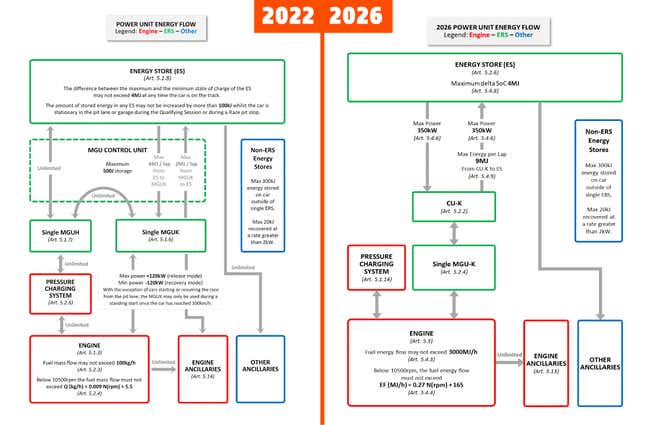The current Formula 1 power unit regulations are officially set to be replaced at the end of the 2025 season after the Fédération Internationale de l’Automobile (FIA) approved the championship’s next generation of hybrid power unit regulations. The 2026 FIA Formula 1 World Championship season will see the debut of cars powered by turbocharged 1.6-liter V-6 engines, similar to the current engines, and more powerful energy recovery systems. The new power unit will produce over 1,000 horsepower using a 100-percent sustainable fuel.

The most significant change that Formula 1’s power units will see is the removal of the Motor Generator Unit - Heat (or MGU-H). The MGU-H harvested electricity from the exhaust gases spinning the turbocharger. The MGU-H could use the stored energy to power the turbocharger electrically, independently or in conjunction with the combustion exhaust. The complexity of this system made F1 power unit development far more expensive than it already was. The expense was a cited reason behind several manufacturers’ lack of interest in entering Formula 1.
The maximum allowed output of the Motor Generator Unit - Kinetic (MGU-K), the car’s electric motor and generator, has been dramatically increased to compensate for the MGU-H’s removal. The MGU-K will be allowed to deploy power at 350 kilowatts (or 469.3 horsepower) instead of the previous 120 kilowatts (160.9 hp). This increase also means that 46.7 percent of an F1 car’s total power output will be derived from an electric motor.
FIA President Mohammed Ben Sulayem, said:
“The introduction of advanced PU technology along with synthetic sustainable fuels aligns with our objective of delivering benefits for road car users and meeting our objective of net zero carbon by 2030. Formula 1 is currently enjoying immense growth and we are confident these Regulations will build on the excitement our 2022 changes have produced.”
The new regulations also state that fuel used in the internal combustion engine has to be “certified to have been derived from a carbon capture scheme, a renewable fuel of nonbiological origin (RFNBO), municipal waste, or non-food biomass.” With this push for sustainability and the controls put in place to ensure lower development costs, major automakers might be interested in joining Mercedes, Ferrari and Renault in F1. Porsche and Audi are both rumored to be joining the world championship, but only time will tell if anyone else follows their lead.